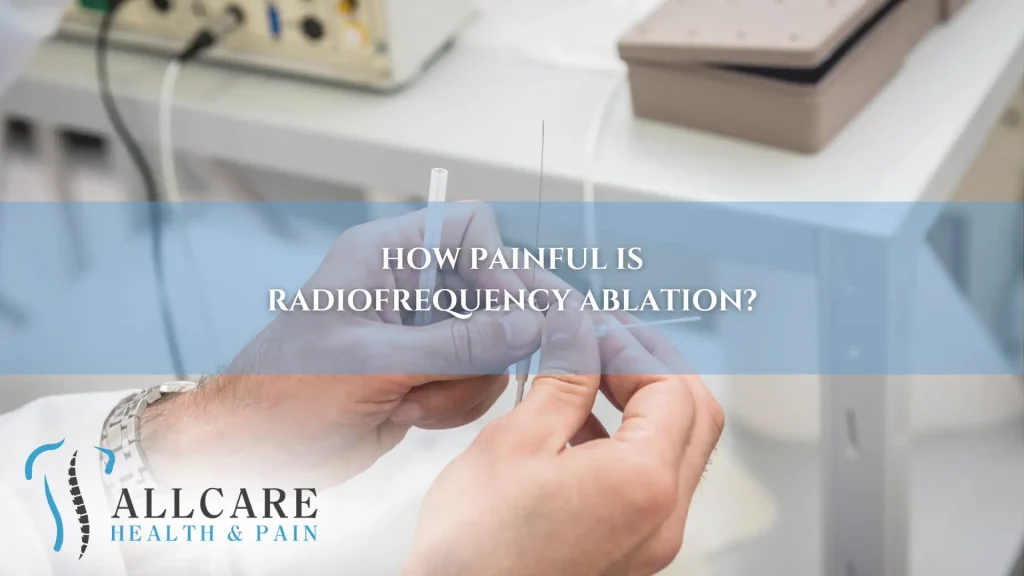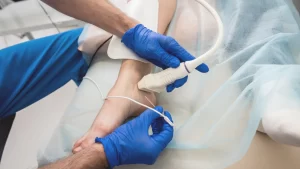
If you’re considering radiofrequency ablation to manage your chronic pain, you might have understandable concerns about its efficacy and how much discomfort you might experience during the procedure.
The good news is that radiofrequency ablation is a safe and effective treatment option for chronic pain. The procedure involves using radio waves to target nerve fibers that send pain signals to the brain. This can provide long-lasting relief from chronic pain, allowing you to return to your loved activities without surgery or medication.
While you might experience some discomfort during your recovery period, most patients find that the benefits of radiofrequency ablation far outweigh any temporary distress. At AllCare Health & Pain, our team will work closely with you to ensure a smooth and successful recovery. We are committed to providing quality, personalized treatment plans to help you manage your chronic pain. Contact us today to schedule a consultation and learn how radiofrequency ablation can help you find relief.
How Radiofrequency Ablation Works
Radiofrequency ablation (RFA) is a minimally invasive treatment of chronic pain. During the procedure, a needle is inserted near the affected nerves, and radio waves are used to generate heat, destroying nerve fibers responsible for transmitting pain signals to the brain. The procedure is typically performed outpatient; patients usually return to normal activities within days.
What’s the Purpose of Radiofrequency Ablation?
The primary goals of RFA include:
- Reducing or stopping chronic pain
- Reducing or eliminating the need for medications
- Avoiding or delaying surgical treatments
- Improving function and mobility
Medical Conditions RFA Can Treat
RFA can effectively treat pain from numerous medical conditions, such as:
- Cancer
- Arthritis in the spine or joints
- Trigeminal neuralgia
- Chronic back or neck pain
- Peripheral nerve pain
- Chronic joint pain
Some patients aren’t good candidates for radiofrequency ablations. The procedure might not be a good fit for you if:
- You have a bleeding disorder
- You have an infection
- You are pregnant
How to Prepare for Radiofrequency Ablation
Before scheduling your RFA procedure, your doctor will review your medical history and current medications. They will also ask you to describe the pain you are experiencing. You might have to stop taking blood-thinning medications or certain pain relievers for several days before the procedure. You might also need to sit for a physical examination and imaging tests to assess your anatomy, determine the injury or arthritis causing your pain, and rule out other medical conditions.
The Radiofrequency Ablation Process
Before the procedure begins, you’ll lie on a special X-ray table on your stomach. Your doctor will keep you awake during the RFA, so you provide feedback as they go. They will also use monitors to assess your condition.
A local anesthetic will numb the injection site so you don’t feel the needle your doctor inserts into your skin. Your doctor will insert the needle near the location of your pain and use a fluoroscopy imaging tool to guide it to the intended nerve.
A microelectrode test will determine whether the needle is in the correct position before the RFA begins. Your doctor will ask if you feel twitches, discomfort, or tingling sensations in the affected area. If you do, they can continue with the procedure.
A local anesthetic will numb the area so you don’t feel anything while the radiofrequency current travels through the needle to heat the targeted nerve. The current will destroy the part of the nerve that triggers your pain to prevent it from continuing to transmit signals to your brain. If necessary, the physician can treat more than one area during RFA.
The treatment location and the number of areas treated during the procedure will determine how long it takes. RFA treatments can take anywhere from fifteen minutes to two hours.
How Long Before I Experience Pain Relief with Radiofrequency Ablation?
 Many patients notice relief immediately after radiofrequency ablation procedures. For others, pain relief comes within days or weeks. The effects of the treatment can last months to a year or even longer.
Many patients notice relief immediately after radiofrequency ablation procedures. For others, pain relief comes within days or weeks. The effects of the treatment can last months to a year or even longer.
Contact AllCare Health & Pain to Learn More About Radiofrequency Ablation Today
If you’re suffering from chronic pain, don’t let it control your life any longer. Radiofrequency ablation is a safe and effective treatment option to help you find long-lasting relief. Call AllCare Health & Pain today at 201-386-9800 to schedule a consultation with one of our experienced pain management specialists.
Related posts:

